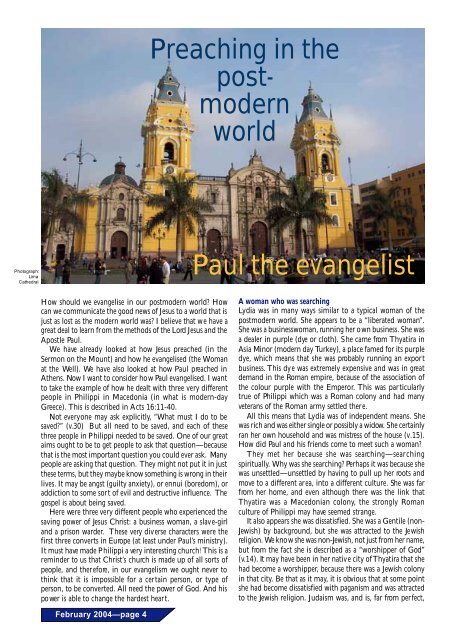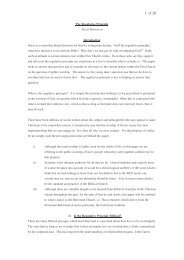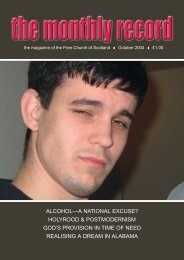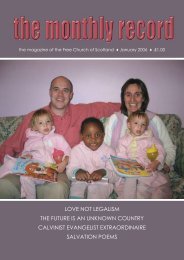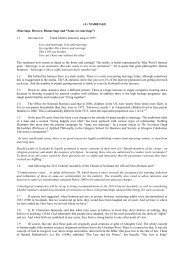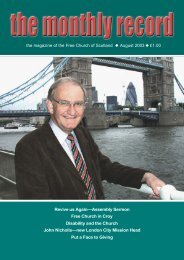truth is god's truth paul the evangelist - Free Church of Scotland
truth is god's truth paul the evangelist - Free Church of Scotland
truth is god's truth paul the evangelist - Free Church of Scotland
Create successful ePaper yourself
Turn your PDF publications into a flip-book with our unique Google optimized e-Paper software.
Photograph:<br />
Lima<br />
Ca<strong>the</strong>dral<br />
How should we evangel<strong>is</strong>e in our postmodern world? How<br />
can we communicate <strong>the</strong> good news <strong>of</strong> Jesus to a world that <strong>is</strong><br />
just as lost as <strong>the</strong> modern world was? I believe that we have a<br />
great deal to learn from <strong>the</strong> methods <strong>of</strong> <strong>the</strong> Lord Jesus and <strong>the</strong><br />
Apostle Paul.<br />
We have already looked at how Jesus preached (in <strong>the</strong><br />
Sermon on <strong>the</strong> Mount) and how he evangel<strong>is</strong>ed (<strong>the</strong> Woman<br />
at <strong>the</strong> Well). We have also looked at how Paul preached in<br />
A<strong>the</strong>ns. Now I want to consider how Paul evangel<strong>is</strong>ed. I want<br />
to take <strong>the</strong> example <strong>of</strong> how he dealt with three very different<br />
people in Philippi in Macedonia (in what <strong>is</strong> modern-day<br />
Greece). Th<strong>is</strong> <strong>is</strong> described in Acts 16:11-40.<br />
Not everyone may ask explicitly, “What must I do to be<br />
saved?” (v.30) But all need to be saved, and each <strong>of</strong> <strong>the</strong>se<br />
three people in Philippi needed to be saved. One <strong>of</strong> our great<br />
aims ought to be to get people to ask that question—because<br />
that <strong>is</strong> <strong>the</strong> most important question you could ever ask. Many<br />
people are asking that question. They might not put it in just<br />
<strong>the</strong>se terms, but <strong>the</strong>y maybe know something <strong>is</strong> wrong in <strong>the</strong>ir<br />
lives. It may be angst (guilty anxiety), or ennui (boredom), or<br />
addiction to some sort <strong>of</strong> evil and destructive influence. The<br />
gospel <strong>is</strong> about being saved.<br />
Here were three very different people who experienced <strong>the</strong><br />
saving power <strong>of</strong> Jesus Chr<strong>is</strong>t: a business woman, a slave-girl<br />
and a pr<strong>is</strong>on warder. These very diverse characters were <strong>the</strong><br />
first three converts in Europe (at least under Paul’s min<strong>is</strong>try).<br />
It must have made Philippi a very interesting church! Th<strong>is</strong> <strong>is</strong> a<br />
reminder to us that Chr<strong>is</strong>t’s church <strong>is</strong> made up <strong>of</strong> all sorts <strong>of</strong><br />
people, and <strong>the</strong>refore, in our evangel<strong>is</strong>m we ought never to<br />
think that it <strong>is</strong> impossible for a certain person, or type <strong>of</strong><br />
person, to be converted. All need <strong>the</strong> power <strong>of</strong> God. And h<strong>is</strong><br />
power <strong>is</strong> able to change <strong>the</strong> hardest heart.<br />
February 2004—page 4<br />
Preaching in <strong>the</strong><br />
postmodern<br />
world<br />
Paul <strong>the</strong> evangel<strong>is</strong>t<br />
A woman who was searching<br />
Lydia was in many ways similar to a typical woman <strong>of</strong> <strong>the</strong><br />
postmodern world. She appears to be a “liberated woman”.<br />
She was a businesswoman, running her own business. She was<br />
a dealer in purple (dye or cloth). She came from Thyatira in<br />
Asia Minor (modern day Turkey), a place famed for its purple<br />
dye, which means that she was probably running an export<br />
business. Th<strong>is</strong> dye was extremely expensive and was in great<br />
demand in <strong>the</strong> Roman empire, because <strong>of</strong> <strong>the</strong> association <strong>of</strong><br />
<strong>the</strong> colour purple with <strong>the</strong> Emperor. Th<strong>is</strong> was particularly<br />
true <strong>of</strong> Philippi which was a Roman colony and had many<br />
veterans <strong>of</strong> <strong>the</strong> Roman army settled <strong>the</strong>re.<br />
All th<strong>is</strong> means that Lydia was <strong>of</strong> independent means. She<br />
was rich and was ei<strong>the</strong>r single or possibly a widow. She certainly<br />
ran her own household and was m<strong>is</strong>tress <strong>of</strong> <strong>the</strong> house (v.15).<br />
How did Paul and h<strong>is</strong> friends come to meet such a woman?<br />
They met her because she was searching—searching<br />
spiritually. Why was she searching? Perhaps it was because she<br />
was unsettled—unsettled by having to pull up her roots and<br />
move to a different area, into a different culture. She was far<br />
from her home, and even although <strong>the</strong>re was <strong>the</strong> link that<br />
Thyatira was a Macedonian colony, <strong>the</strong> strongly Roman<br />
culture <strong>of</strong> Philippi may have seemed strange.<br />
It also appears she was d<strong>is</strong>sat<strong>is</strong>fied. She was a Gentile (non-<br />
Jew<strong>is</strong>h) by background, but she was attracted to <strong>the</strong> Jew<strong>is</strong>h<br />
religion. We know she was non-Jew<strong>is</strong>h, not just from her name,<br />
but from <strong>the</strong> fact she <strong>is</strong> described as a “worshipper <strong>of</strong> God”<br />
(v.14). It may have been in her native city <strong>of</strong> Thyatira that she<br />
had become a worshipper, because <strong>the</strong>re was a Jew<strong>is</strong>h colony<br />
in that city. Be that as it may, it <strong>is</strong> obvious that at some point<br />
she had become d<strong>is</strong>sat<strong>is</strong>fied with pagan<strong>is</strong>m and was attracted<br />
to <strong>the</strong> Jew<strong>is</strong>h religion. Juda<strong>is</strong>m was, and <strong>is</strong>, far from perfect,


